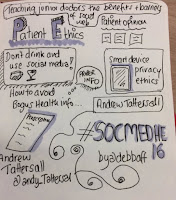 |
| Andy Tattersall |
The day started with a key not, (not keynote) which was an introduction to the theme for this year's conference - The Empowered Learner?
 |
| Giving my presentation in my Christmas jumper |
My presentation was one of six Thunderstorm sessions and was about my Masterclass ILA which I have run for the last couple of years for fourth year medical students. The abstract is below.
 |
| Sketchnote of my talk @debbaff |
The short set of slides from my talk can be viewed below.
 |
| One of the winning teams - me on the right |



